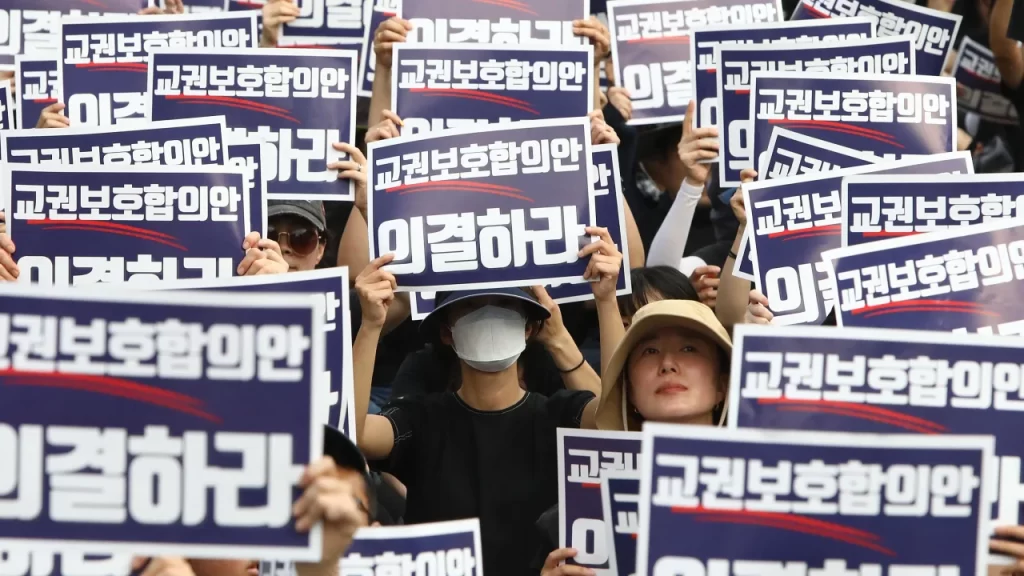Thousands of protestors have taken to the streets in South Korea, demanding better protection and legal reforms for educators. The tragic suicide of a 23-year-old elementary school teacher in Seoul has sparked a fervent demand for change within South Korea’s education system. The unnamed young teacher is believed to have taken her own life due to conflicts with demanding parents. Her untimely death has exposed the challenges and pressures faced by teachers, from conflicts with demanding parents to a lack of support from education authorities. In a powerful display of unity, as many as 200,000 teachers and their supporters have taken to the streets, dressed in black and holding white flowers as symbols of mourning. They stand as a resilient voice, calling for measures to protect the rights and well-being of educators nationally.
Many attribute this uproar to the perceived unfairness of the 2014 child abuse law in South Korea (specifically the Act on Special Cases Concerning the Punishment of Child Abuse Crimes). This law allows anyone to report suspected child abuse without needing to provide concrete evidence. While the law was designed to protect children from abuse, it has had unintended consequences for teachers as they can be unfairly targeted by parents who perceive that their child has been disciplined in some way. These allegations, at times, have put teachers’ jobs and reputations at risk, creating an atmosphere of anxiety and high stress.
Teachers have spoken out about the lack of safeguards to protect them, leading to feelings of vulnerability and helplessness. Among the protests, an unnamed teacher said, “We are seeing the children’s right to be protected being respected at all times, while teachers’ responsibility to teach children how to behave appropriately is being dwarfed by the law to prevent child abuse. This needs to improve.” The troubling statistics reveal that 100 public school teachers in South Korea took their own lives from 2018 to mid-2023. While not explicitly linked to job-related factors in the data, the timing and circumstances surrounding many of these tragic deaths have raised concerns within the education community.
For many teachers, these incidents hit close to home. They have long felt that their schools fail to provide adequate safety measures and support in dealing with challenging situations involving students and parents. The fear of facing parental complaints, often involving verbal abuse, has left teachers feeling vulnerable and stressed. One elementary school teacher, Park Seo-yoon, recounts, “We’ve all received late-night calls from parents accusing us of disrespecting their precious children because they were disciplined for not participating in class.” She further articulates her frustration at the malicious complaints saying, “We’ve had parents yell at us about giving three sentences of praise to one student but only two to the other.”
However, there is a glimmer of hope. Due to the increasing frustration among educators and the sustained protests, South Korea has successfully passed a set of legal revisions known as the “teacher rights restoration bills.” These four bills represent a significant step towards enhancing the working conditions and protections for educators in the country. A notable change brought by these bills is that teachers will no longer be automatically suspended if accused of child abuse. The bills also prohibit school principals from downplaying or concealing activities that may have violated a teacher’s rights. Teacher unions in South Korea have expressed their support for these legal revisions, with the Korean Federation of Teachers Union and the Korean Teachers and Education Workers Union welcoming the move. However, it’s worth noting that achieving the full effectiveness of these laws may be challenging, with concerns related to manpower, budget support, and the need for additional legislation.
In conclusion, the tragedy that struck a young teacher in South Korea has led to a remarkable turning point in the country’s education system. Teachers have united to demand safeguards against parental harassment and abusive complaints, as well as improved support for their mental health and well-being. The passage of the “teacher rights restoration bills” represents a significant victory for South Korean educators and a testament to the power of collective action and the commitment to positive change. It is a beacon of hope not only for teachers in South Korea but also for educators worldwide, illustrating that, with determination and solidarity, positive change can be achieved.
Works Cited
Jessie Yeung, Gawon Bae. “South Korean Teachers Hold Mass Protests After Suicide Highlights Pressures From Parents | CNN”. Cnn.Com, 2023, https://www.cnn.com/2023/09/05/asia/south-korea-teachers-protest-suicide-intl-hnk/index.html#:~:text=The%20teacher%20had%20taught%20first,an%20investigation%20into%20the%20death. Accessed 13 Sept 2023.
“Suicide Spotlights Abuse Of Teachers By Students And Parents”. Koreajoongangdaily.Joins.Com, 2023, https://koreajoongangdaily.joins.com/2023/07/20/national/socialAffairs/Korea-teacher-death/20230720181217154.html. Accessed 13 Sept 2023.
“Korean Teacher’s Suicide Sparks Massive Outpouring Of Grief, Calls For Protections For Educators”. English.Hani.Co.Kr, 2023, https://english.hani.co.kr/arti/english_edition/e_national/1101204.html. Accessed 13 Sept 2023.
“Abused, Traumatised And Powerless: South Korea’s Teachers On Why They Are Protesting”. The Guardian, 2023, https://www.theguardian.com/world/2023/sep/08/south-korea-teacher-protest-why-are-teachers-protesting. Accessed 13 Sept 2023.
